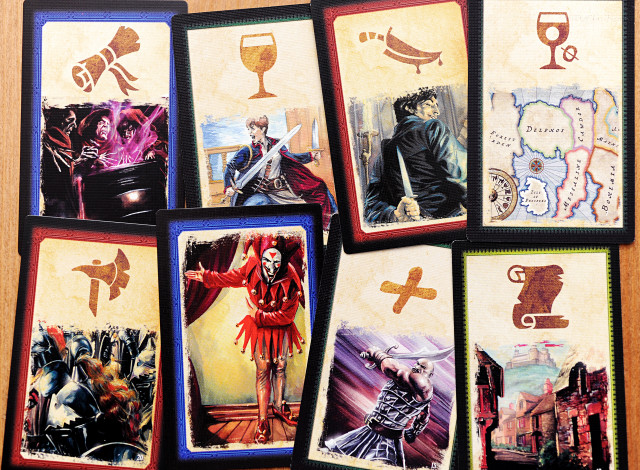Themes and stories from other media crossing into the board game world is nothing new, but, until recently, licensed games were often not considered that great. Some brands were a perfect fit for a game—like Nancy Drew, Superman or James Bond—but too often these games have settled for roll and move mechanics and relied on the license to sell games. Occasionally, board games have gone the other way and made the leap onto the silver screen, as with the criminally underrated Clue (1985) and the let’s-not-talk-about-this-
Slowly, the trend is beginning to shift with more effort being put into games that take their inspiration from different sources. No longer is the license tag a kiss of death. Martin Wallace had a hit with Discworld, set in Terry Pratchett’s Ankh-Morpork universe. Wallace used the randomness and humour of the stories to his advantage, creating a silly and chaotic game that is actually a heck of a lot of fun to play. Firefly: The Game perfectly captures the feel of the short lived show. At its heart, it’s a pick up and deliver game that should please any hard core gamer, but there’s enough of the flavour of the series in the game that fans will feel as if they’re playing out an episode of the show. Fantasy Flight has done wonders with the Star Wars license, creating hits like X-Wing, Star Wars LCG and the recent hit Imperial Assault.
Comic books offer a natural crossover into board games. In 1966 alone there were eight Batman-licensed games, including the Batman and Robin Marble Maze Game and the Batman Jigsaw Puzzle Game. Luckily, comics, too, are now getting the full designer treatment with titles like Legendary and Batman: Gotham City Strategy Game. But just as games have evolved, so too have comics. Now, many of the stories are less about costumed super heroes and more about rich human lives and experiences.
The Toronto-born comic series Kill Shakespeare has been engaging fans for nearly a decade, and now it’s jumping into the board game world. Co-creator Conor McCreery, recently launched the new title from publishers IDW and designers Thomas Vande Ginste and Wolf Plancke.
“Kill Shakespeare is an action adventure story and it takes all of Shakespeare’s characters and puts them in a shared world,” says McCreery, who came up with the idea with Anthony Del Col as a joke on the Kill Bill movies. “It started as a comic book series and from there it moved to the stage. We’ve done a stage play that’s been in 25 cities now; we’ve done a prototype of a mobile game and we’re developing it for television.”
Clearly, this is a license that’s not new to different platforms, but board games always felt like a perfect fit to McCreery. Growing up, both he and Del Col were avid board gamers. They cut their teeth on games like Axis and Allies and Diplomacy, so it was important to them that a Kill Shakespeare title was not just a slapped on theme for a game. They wanted there to be a real sense of the comic in the game play.
McCreery got a chance to play Yedo, also designed by Thomas Vande Ginste and Wolf Plancke, to familiarize themselves with their style. “Once we got a sense of how they design it was really easy for us to say, “Look guys, go and run with it.” Throughout the process McCreery and Del Col were able to work with the design team and help out with different aspects of the design.
“We did weigh in with some of the options, especially in terms of theme,” says McCreery. “It was important to us that you don’t need to know a lot of Shakespeare to play the game. In fact, you don’t need to know any Shakespeare to play the game.”
A key element for the writers and designers was that there was true integration between the series and the board game. Van Ginste and Plancke invested themselves into the world of Kill Shakespeare and tried to incorporate elements that reflected the evolving story lines. “In our most recent comic book series called Mask of Night, we introduce a new character, Viola, and she is actually one of the key characters in this game. There’s little hints here that link back to the comic series.”
The game itself is a semi-cooperative where players will take the roles of Hamlet, Juliet, Falstaff, Othello and Viola, combating the evil plans of Richard III and Lady MacBeth. “This is the semi-coop for people that think they hate semi-coops,” said McCreery. Players are going to work together to a point, but eventually someone is going to have to make a move to break with the rest of the pack. “Every turn there’s a planning phase where you all have to work together to try and figure out how to use your scarce resources, and then as you play your turn…you know, best laid and all that….
For Del Col and McCreery making sure that the game was actually worth playing for gamers was a major goal. Kill Shakespeare is definitely not a re-themed Monopoly game. There is a lot of depth and strategy to dissect. “It’s moderately difficult to learn and difficult to master, but in the best possible way,” says McCreery. “It really rewards multiple plays.”
Players work through six rounds trying to stop the spread of Richard the III’s influence on the land of Illyria, and complete quests along the way. Each round contains Prep, Event, Bidding and Action phases, with a Scoring phase at the end of the third and sixth round. In almost Pandemic-like style, the dark influence of Richard spreads and players must join forces to combat it. When the team’s total influence in an area exceeds Richard’s, a battle immediately takes place with players removing pairs of their influence and Richard’s until there is only one player’s token left.
The Scoring phases award points for three different relative categories: having the most influence on the board, completing the most quests, and controlling the most areas on the board. Players will also receive points for Iago cards, Battle tokens and Jester cards.
The game comes to an early end if Richard reaches the end of the Search for Shakespeare track and succeeds in, you know…killing Shakespeare. It can also spell doom for the players if four areas on the board have lost all hope or if Richard’s influence has spread 13 or more of his influence around the board.
McCreery is right, this is not an easy game to master. It will take a few plays before you truly get the subtler elements of the game play and design, but whether you’re well-schooled in the works of the bard or just love a great game, the rewards are there if you put in the effort.
Comments
No comments yet! Be the first!